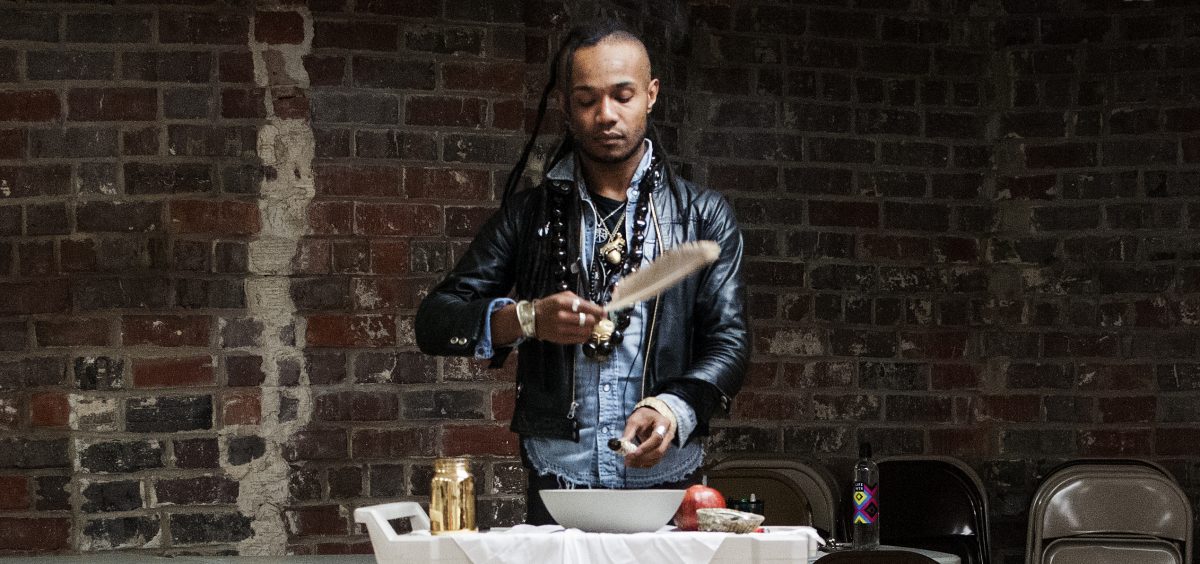
Transgender Faith Leaders Answer the Call to Become Prophets
By: Delaney Murray, Michael Kromer, Salgu Wissmath
Posted on:
Attending an affirming church is not always an option for members of the LGBTQ community, so queer people often have to seek out nontraditional ways to do faith.
For transgender people who are called to serve as clergy, there are a handful of protestant denominations that will ordain them. However for those in denominations that don’t offer a path to ordination, those people have to find creative ways to follow their calling.
The Revolutionary Jé Hooper is a humanist clergy leader and is currently a PHD student in the interdisciplinary arts program at Ohio University. He also has helped lead a self care retreat at Ohio University called ‘I Quit.’
Hooper has been preaching from a very young age, starting when he was 13. He grew up in the Pentecostal church where he learned how to preach through emulating others.
“I’ve always felt the call,” Hooper said. “It actually comes out of me naturally.”
Hooper’s call to be a preacher is intertwined with his identity as a two spirit. For Hooper, who is Afro Indigenous and part of the Pamunkey tribe in Virginia, being a two spirit means being able to identify with any gender pronoun.
“To be a two spirit is very interesting because it is a prophetic call,” Hooper said. “Two spirit people were prophetic voices in the community. That actually asserted their voices through sensuality, their sensuality held their prophecy, and it held communal victory and liberation.”
Hooper is not the only transgender clergy who is called to be a prophet, or someone who teaches lessons of faith in or outside of a larger church. Alex Shanks, a lay minister in the United Methodist Church in Columbus, Ohio, has also answered the call, and personally believes that his role is to serve the Christian faith around the issue of LGBT inclusion.
“In scripture, it’s hard for prophets to exist inside of religious institutions,” Shanks said. “We see that many times in the Bible that prophets will have one foot in the church and one foot out if they even have one foot at all. But they are always speaking to and addressing people that are part of the institution.”
However, Shanks is currently serving that call outside of the church. Now, the only work he does directly within the church is organizing with the Reconciling Ministries Network, but his day job is as a project and field director for Equality Ohio.
Hooper also no longer has one foot in the institutional church because he was pushed out when he was diagnosed with HIV.
“That was one of the things that had me removed from the Christian Church,” Hooper said. “Immediately as soon as that was put into play, it was very quick the following week, they removed my license. I was no longer ordained.”
Stripped of his Christian community, Hooper soon found sanctuary in the house ball community. The house ball community is largely made up of queer and trans people. They use dance and lip synching and other performance art to create a community.
“It became my sanctuary,” Hooper said. “It became my worship. I realized being in this community that there was so much love there. In some way, I guess you could say I caught the spirit.”
Today Hooper is a Humanist clergy. Humanism is a tradition that Hooper says is for “those who are non-theistic, atheist, agnostic, or free thinking.”
“We are an organization for those who do not have a religion at all,” Hooper said. “It’s a very interesting position to work with people who actually just want to be in community. And they worried about ethics basically just want to do the right thing.”
Hooper’s queer identity has also allowed him to reimagine his faith and the same goes for Shanks. His trans identity and spiritual journey has reshaped his view on God. It has allowed him to think of God as a gender neutral being, which implies that God could also create gender neutral beings.
“I think about who God is, my mind and my spirit is more open to the possibilities to take God outside of these boxes that people put God in,” Shanks said. “So this idea that God is male or outside of the box of gender.”
Hooper’s message of showing up unapologetically is a message about finding pride in your identity. And in a world where trans people are often shamed for who they are — it’s a powerful message of finding belonging in yourself.
“My pride is situated in the unapologetic truth,” Hooper said. “And I believe that as soon as we get to a place where we can be truthful, we never have to hide who we are. We never have to be ashamed.”

